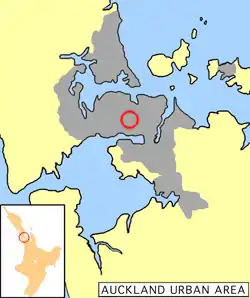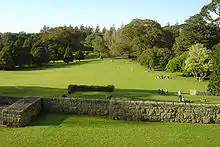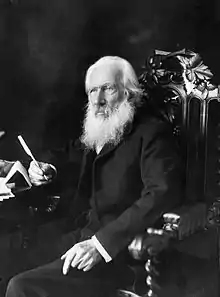| Cornwall Park | |
|---|---|
_(cropped).jpg.webp) One Tree Hill near the heart of Cornwall Park | |
 location within Auckland | |
| Type | Park open to the public owned by Cornwall Park Trust |
| Location | Epsom, Auckland, New Zealand |
| Coordinates | 36°53′54″S 174°47′05″E / 36.898411°S 174.784821°E |
| Area | 670 acres (270 hectares) |
| Created | 1901 |
| Operated by | Cornwall Park Trust |
| Status | Open year round during daylight |
| Website | www |
.jpg.webp)
Cornwall Park is an expansive parkland in Epsom near the heart of Auckland, New Zealand, surrounding the park containing Maungakiekie pa or the hill of One Tree Hill. The two independent parks form one large park of 670 acres (270 hectares).
The Park has centuries-old heritage sites, wide-open spaces, tree lined avenues and walks, places of peace and tranquility in a large city, sports grounds including tennis and bowls and a working farm for the education of city children.
John Logan Campbell, Auckland resident since 1840 and, at the time of this gift, mayor, gave the park's 230 acres to a private trust on 10 June 1901. The adjoining Park Maungakiekie had been purchased by the national government in 1845 and since 2012 belongs to Ngā Mana Whenua o Tāmaki Makaurau Collective.[1]
Campbell chose to present the deeds the following day to the visiting heir to the throne, the Duke of Cornwall and York later George V asking his consent for it to be named Cornwall Park in honour of the Duke.[2] A few weeks later the adjoining Alexandra Park was named in honour of the Duke's mother.[3]
Origin
Land
Campbell gave the land to Cornwall Park Trust, a trust he had established for the purpose. The park was described at the time as "two hundred and thirty acres of the finest land in the district", or 93 hectares, a portion of some 1,100 acres (450 hectares) at One Tree Hill bought by Dr Campbell many years before. He had planned to build a house there and planted the parkland in preparation for that but he subsequently chose to live near the centre of the city in Parnell, his home was named 'Kilbryde' and situated on part of the site of their rose gardens.[2] Still marked by his trees the carriage drive he made in Cornwall Park sweeps in an S-bend from Puriri Drive across Greenlane west of the Park's Greenlane entrance to his house site near Huia Lodge. Visitors may walk along it from the gate opposite the Park's administration and works depot in Greenlane. There were to be further gifts including the land about Puriri Drive and Campbell Crescent and the endowment lands, housing sites to be made available on 21-year leases.[4]
Cornwall Park operates Glasgow leases now outlawed in the United Kingdom. As property values increased in Auckland, the formula for setting the rents has led to higher prices. Logan Campbell specified that leases would allow fair value to the leaseholders for improvements to the property. Some leaseholders have walked away from their family homes unable or unwilling to pay. Cornwall Park was unable to lease a section and it has sat empty for 16 years. Cornwall Park Leaseholders Association was formed to represent leaseholders and negotiate a fairer lease. A petition has been launched seeking some of the Lusk KC Report findings including fair compensation for improvements or a freeholding option.[5]
Cornwall Park Trust
The deeds handed to the trustees stated "the said lands are and shall be held by the Trustees on trust for the people of the colony of New Zealand, and also for such public purposes for the general benefit of the people of New Zealand in the way of affording them recreation, enjoyment, pleasure and instruction and other similar benefits and advantages of that nature as the Trustees shall from time to time consider best."[2]
Management
The trustees, acting through The Cornwall Park Trust Board Inc, also manage the Campbell Trust. Until 2012 they also managed the One Tree Hill Domain on behalf of the Auckland Council.[6] Their One Tree Hill Domain responsibility has ceased and Ngā Mana Whenua o Tāmaki Makaurau Collective decides upon and implements its own policies on Maungakiekie/One Tree Hill Domain.
The first Cornwall Park trustees were David Murdoch, Arthur Myers (chairman), Robert Hall and Alfred Bankart.[2]
Chairmen of Trustees
- A M Myers (1901–1926)
- A S Bankart (1926–1927)
- J H Gunson (1927–1956)
- A U Wells (1956–1974)
- B P Stevenson (1975–1983)
- K B Myers (1983–1991)
- R H L Ferguson (1991–2007)
- H M Horton (2007–2011)
- J L Clark (2011– )
- J A W McConnell
- A F Young-Cooper ( –present)[1]
.jpg.webp) Archery |
.jpg.webp) on Memorial Steps |
 vista from Memorial Steps |
Design
A scheme was laid out by young landscape designer Austin Strong (1881–1952)[note 1] inspired by Golden Gate Park in San Francisco.
Ongoing design is managed by New York-based landscape architecture firm Nelson Byrd Woltz Landscape Architects in collaboration with New Zealand-based Boffa Miskell.[7]
Endowment
In 1907 a second gift of 104 acres (42 hectares) and the following year another 143 acres (58 hectares) for endowment to be let on building leases to create income to help with the park's upkeep. Together these new gifts made a total area of 477 acres (193 hectares) within Cornwall Park. Combined with the adjoining almost encircled city-owned One Tree Hill Domain of 130 acres (53 hectares) there was now one Park of 607 acres (246 hectares).[8]
However the trustees were personally liable for any expenditure that could not be met by the trust's funds and so in 1914 residential sites along Wheturangi Road were sold on long term lease to meet immediate needs for cash and the trustees asked that local bodies give consideration to some form of rate relief complaining that over 60 per cent of the trusts revenue went in taxes.[9] St Cuthbert's College took 8 acres by the formal entrance on a 99-year building lease in 1919.[10] After many years of petitions and representations from Auckland to Parliament in 1922 Parliament decided that the Cornwall Park land should be valued for rating purposes at its "restricted value", this valuation of the park having regard to its income as grazing land. By this time the capital value of the Park's land exceeded £200,000.[11]
As the Great Depression began to subside and New Zealand's new Socialist government began to change government's policies there was a leap in the Government's assessment for the park's land tax from £300 to £1,400. One Tree Hill Borough's councillors agreed to apply to the Government for the Government's consent to exempt the Park from payment of their rates on the Park's land.[12] The Government agreed and passed enabling legislation in September 1938.
In 1952 following the death of his only daughter Campbell's remaining estate, then valued at £400,000, passed under the control of the Cornwall Park Trustees and the income is allocated according to Campbell's wishes to a wide range of purposes.[13]
Income received by the trustees from the trust's property is exempt from Income Tax.
Restrictions
- No more riding or golf
Soon after the beginning of World War II riding and golf were banned. Horses for the damage to lawns, although tracks were provided, and golf for the annoyance and danger to sheep grazing in the park.[14] Subsequently it was decided that golf was not a use available to the people generally and did not comply with the trust deed and the Auckland Golf Club's and Maungakiekie Golf Club's privileges were ended.[15] In any case the trust deed required construction of "Grand Avenue" through the land at present used for golf.[16]
Cornwall Hospital
From 1942 to 1945 the park was occupied by the nation's defence forces as a site of temporary barracks and a temporary hospital was built for the United States Army in the eastern area of Cornwall Park. Initially for 1050 patients and their 715 attendants[17] — the U.S. 39th General Hospital[18] — it was very shortly doubled in capacity to 2,000 beds.[19] There were 122 separate buildings with a floor area of 8 acres, built in just over 6 weeks during a wet winter on 34 acres (14 hectares) of the park.[20]
In 1944 the Government proposed to compulsorily acquire a portion of the land to build a home for blinded ex-servicemen. It was protested that in June 1942 an undertaking had been given that the area would not be used for other than war purposes[21] but to no avail whatsoever. The hospital buildings became Cornwall Hospital and included maternity facilities, National Women's Hospital, and a geriatric hospital. All buildings on the site were demolished in 1975. The hospital for blinded servicemen remains in the adjoining Park Maungakiekie/One Tree Hill Domain, and is known as Sorrento in the Park, an events venue.
_showing_One_Tree_Hill_1treehill4mmteden_(cropped).JPG.webp)
Activities
On top of admiring scenery, drinking tea while the Band plays on its rotunda, picnicking, birdwatching, walking, jogging, bicycling, keeping the dog secure on its leash and admiring the ewes and their lambs, provisions for formalised activities include:
- Tennis: Campbell Park Tennis Club
- Cricket: Cornwall Cricket Club
- Rugby union: Grammar Carlton RFC is based here
- Rugby league: The headquarters of the Auckland Rugby League
- Archery located in neighboring Park Maungakiekie/One Tree Hill Domian: Auckland Archery
- Lawn bowls: Carlton Cornwall Bowls
- Parkrun: parkrun New Zealand
Comparisons – area
Comparison with other significant city parks, worldwide:
- Richmond Park, London: 2,360 acres (960 hectares)[22]
- Bois de Boulogne, Paris: 2,088 acres (845 hectares)[23]
- Golden Gate Park, San Francisco: 1,017 acres (412 hectares)[24]
- Central Park, New York: 843 acres (341 hectares)[25]
- Hyde Park, London together with Kensington Gardens: 620 acres (250 hectares)[25]
- Cornwall Park: 425 acres (172 hectares)
- Hagley Park, Christchurch: 407 acres (165 hectares)[26]
- Botanical Gardens, Wellington: 62 acres (25 hectares)[27][28]
Publications
The Cornwall Park Trust Board's publications include:
- Poenamo Revisited, (2012) a facsimile of the 1898 edition of Campbell's autobiography with new annotations and many pictures.[29]
- Cornwall Park, the Story of a Man's Vision[30]
- Reminiscences of a Long Life, Sir John Logan Campbell, edited and introduced by R.C.J Stone, 2017.
- Brochures
- Sir John Logan Campbell
- Cornwall Park
- Cornwall Park Heritage Trail
- Cornwall Park Tree Trail
- Cornwall Park Bird Species
- Cornwall Park Farm
- Acacia Cottage
- Huia Lodge
- Cornwall Hospital 1942–1975
Notes
- ↑ Austin Strong, a step-grandson of Robert Louis Stevenson, was born in San Francisco and grew up in Hawaii, Samoa and Wellington New Zealand where he attended Wellington College. He studied landscape architecture in New York, was chosen to design Cornwall Park and completed the commission. He subsequently became a successful New York playwright. Source Joseph Theroux, Nantucket Historical Association
References
- 1 2 Cornwall Park, the story of a man's vision, The Cornwall Park Trust Board Inc, 1994 Epsom NZ
- 1 2 3 4 Cornwall Park. Auckland Star, Volume XXXII, Issue 138, 12 June 1901, p. 5
- ↑ Alexandra Park. Auckland Star, Volume XXXII, Issue 147, 22 June 1901, p. 3
- ↑ R C J Stone, The Father and His Gift: John Logan Campbell's Later Years Auckland University Press, 1987. ISBN 186940016X
- ↑ Glen, David (23 January 2023). "Dismantling Sir John Logan Campbell's legacy in Cornwall Park". The New Zealand Herald.
- ↑ Auckland City to honour Cornwall Park guardians Scoop Independent News, Monday, 22 September 2003, 10:02 am
- ↑ What's in store for Cornwall Park? Central Leader, Auckland, 10 July 2013
- ↑ Parks and Reserves, Auckland Star, Volume XLII, Issue 182, 3 August 1911, Page 6
- ↑ Cornwall Park, Auckland Star, Volume XLV, Issue 163, 10 July 1914, Page 2
- ↑ St Cuthbert's College, Auckland Star, Volume L, Issue 204, 28 August 1919, Page 6
- ↑ Cornwall Park, Auckland Star, Volume LIII, Issue 115, 17 May 1922, Page 3
- ↑ Increasing taxation, Auckland Star, Volume LXVIII, Issue 196, 19 August 1937, Page 8
- ↑ Campbell Trust, An Encyclopaedia of New Zealand, 1966
- ↑ Cornwall Park, Auckland Star, Volume LXXI, Issue 183, 3 August 1940, Page 16
- ↑ New Hospital? Auckland Star, Volume LXXV, Issue 141, 16 June 1944, Page 6
- ↑ Cornwall Park Golf Club to Go, Auckland Star, Volume LXXIII, Issue 246, 17 October 1942, Page 7
- ↑ Service hospitals Auckland Star, Volume LXXIV, Issue 29, 4 February 1943, Page 6
- ↑ Cornwall Park, drive to be reopened, use early in new year, Auckland Star, Volume LXXVI, Issue 244, 15 October 1945, Page 6
- ↑ hospital Auckland Star, Volume LXXV, Issue 298, 16 December 1944, Page 6
- ↑ "AtoJs Online — Appendix to the Journals of the House of Representatives — 1946 Session I — D-03 MINISTRY OF WORKS REPORT OF THE COMMISSIONER OF WORKS FOR THE PERIOD ENDED 31st MARCH, 1946". atojs.natlib.govt.nz. p. 8. Retrieved 19 May 2016.
- ↑ Trustees Protest Auckland Star, Volume LXXV, Issue 240, 10 October 1944, Page 6
- ↑ Great Britain. Parliament. House of Commons, Richmond Park. Return of the Number of Acres in Richmond Park that Have Been Drained, and the Proportion They Bear to the Whole Area of the Park, and the Average Cost Per Acre. House of Commons, 2006
- ↑ ed: Peter Clark, Professor of European Urban History, Green Landscapes in the European City, 1750–2010 – Page 20, Routledge, New York, 2017 ISBN 9781472464392
- ↑ Alan Tate. Great City Parks. Routledge, Abingdon 2015. ISBN 9780415538022
- 1 2 Tables and Calculations Ed: Rob Roggema, Agriculture in an Urbanizing Society Volume Two: Proceedings of the Sixth Aesop Conference on Sustainable Food Planning. Cambridge Scholars, Newcastle-upon-Tyne, 2017 ISBN 1443899844
- ↑ Ray Joyce, Anna Horne. New Zealand: a special place ... – Page 112, Lansdowne Press, Auckland, 1986. ISBN 0868660884
- ↑ Bette Flagler. New Zealand's North Island. Hunter Publishing, Oxford, England, 2010.
- ↑ New Zealand Waitangi Tribunal. Te Whanganui a Tara Me Ona Takiwa: Report on the Wellington District, Legislation Direct, 2003. ISBN 9781869562649
- ↑ Godwit, Random House, Auckland, 2012. ISBN 978 186979 798 0
- ↑ The Cornwall Park Trust Inc, 1994
Further reading
- Pearson, Dave. (1995) 'A fine legacy'. Historic Places. No. 53, p. 6-8.
